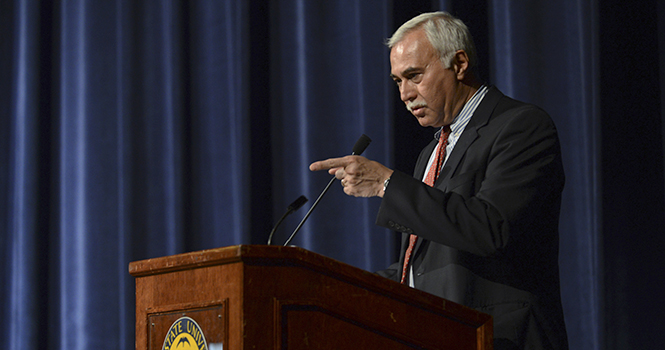Speaker describes principles of excellence at awards ceremony
Jose C. Feliciano, President’s Ambassador for 2012-2013, gives advice to students during his speech at the College of Education, Health and Human Services Awards ceremony on April 22. S. Photo by Melanie Nesteruk
April 22, 2013
José Feliciano, the President’s Ambassador for 2012-2013 told a room full of faculty, students and parents to advocate for themselves and be leaders Monday night at the College of Education, Health and Human Services’ 4th Annual Student Awards Ceremony.
“We get to recognize the students who have distinguished themselves above the rest,” said Daniel Mahony, dean of the College of Education, Health and Human Services. “[These students’] performance inside and outside the classroom has well exceeded the norms and deserves special recognition.”
Mahony then introduced Feliciano, who began his speech with a joke about the compliments Mahony gave him in his introduction.
“My dad would have very much liked it,” Feliciano said. “My mother would believe it.”
Feliciano gave a brief introduction of himself before explaining his principles of excellence and how to use these principles moving forward.
“If you just remember one simple thing from tonight, I will have considered this a success,” Feliciano said.
Feliciano said he grew up in the hills of Puerto Rico and was a self-proclaimed “Puerto Rican hillbilly.” He did not speak English until the age of six and was diagnosed as educationally mentally retarded by the Cleveland Public School System. He did not let these setbacks stop him from being successful, though.
Feliciano said that fear is one of his biggest motivators and that it is something people will always have to deal with.
“From the time of your age to the time of my age, you’re going to face that,” Feliciano said.
Feliciano said that he uses the feeling of fear as a test of how much he wants to achieve something. He said he used this test when applying for a White House Fellows program. He had to write a policy paper for the president of the United States as part of the application process.
“That’s not something I wake up thinking about every day,” Feliciano said.
Continuing with his principles of excellence, Feliciano told the crowd they had to learn to be alone and comfortable by themselves.
Feliciano said that he realized this during his time in high school as well as during his time as a public defender while working on an aggravated robbery case.
“He was totally relying on me,” Feliciano said.
Feliciano advised the crowd to embrace opportunities in which you must rely on yourself.
A third principle Feliciano told the crowd was to remember to raise a hand for themselves.
Feliciano listed some of his many accomplishments before reinforcing that he would not have had them if he did not raise a hand and advocate for himself.
On a final note, Feliciano addressed the difference between hope and reality. He said that if you’re hoping something gets done, it probably won’t.
“The reality is you have to do something to get that done,” said Feliciano.
Before exiting the stage, Feliciano told the crowd to always remember to help the weak.
Faculty members of the College of Education, Health and Human Services then recognized over 100 student recipients of scholarships and awards.
Contact Ashley Gerenday at [email protected].












